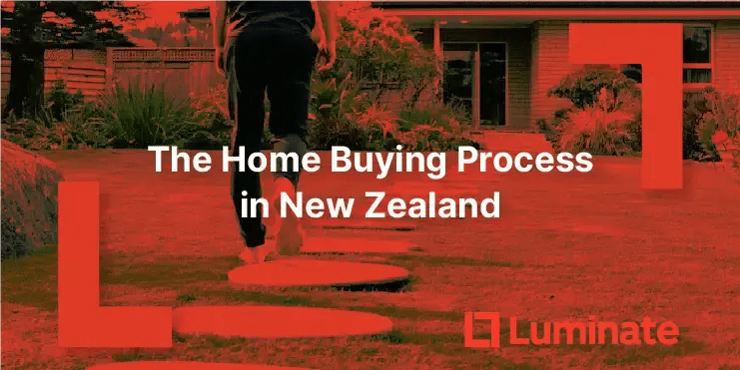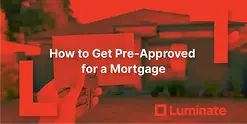Home Buying Process in NZ: Step-by-Step Guide for First-Timers
 By
Trent Bradley
·
18 minute read
By
Trent Bradley
·
18 minute read

Buying your first home is exciting, but it can also feel overwhelming. There are forms, contracts, deadlines, and decisions you've never dealt with before. If you've been thinking about purchasing your first property in New Zealand and wondering where to begin, you're not alone.
Table of Contents
- Overview: The 8 Stages of Buying Your First Home in NZ
- Step 1: Decide if You're Ready to Buy
- Step 2: Get Pre-Approved for a Home Loan
- Step 3: Work Out Your Budget and Hidden Costs
- Step 4: Start House Hunting
- Step 5: Make an Offer or Bid at Auction
- Step 6: Go Unconditional
- Step 7: Prepare for Settlement Day
- Step 8: Move In and Become a Homeowner
- Common First-Home Buyer Mistakes to Avoid
- How Luminate Financial Group Guides You Through Every Step
- Frequently Asked Questions About the Home Buying Process in NZ
Key Takeaway
- The complete home buying journey in New Zealand typically takes 3-6 months from pre-approval to settlement, involving 8 distinct stages with specific tasks and timelines at each step
- Get pre-approved for a home loan before serious house hunting—this shows sellers you're credible, defines your realistic budget (typically 5-7x annual income), and takes only 1-2 weeks
- Budget for hidden costs beyond the deposit including legal fees ($1,500-3,000), building inspection ($500-1,200), LIM report ($200-400), insurance, and moving costs—total upfront costs are typically deposit plus $5,000-8,000
- The conditional period (typically 10-20 business days) after offer acceptance is critical—use this time to complete building inspections, review LIM reports, and secure final bank approval before going unconditional
- For auctions, complete ALL due diligence beforehand as bids are unconditional—never bid at auction without full finance approval, building inspection, LIM review, and lawyer approval already completed
- Understand different title types (freehold, leasehold, cross-lease, unit title) as they significantly affect lending, ownership rights, and ongoing costs like body corporate fees
- Build your own professional team including a mortgage adviser, property lawyer, and building inspector who work for you—the real estate agent represents the seller, not you
- Common first-home buyer mistakes include maxing out borrowing capacity, skipping building inspections, not reading LIM reports properly, making emotional decisions, and underestimating hidden costs
At Luminate Financial Group, we help first-home buyers through this journey every day. Whether you're just starting to save or already house hunting, understanding each stage of the process will help you avoid mistakes, reduce stress, and move forward with confidence.
This comprehensive guide walks you through the full home buying process in New Zealand, step by step, using clear language and practical examples. We'll cover timelines, costs, common pitfalls, and how to navigate each stage successfully.
Overview: The 8 Stages of Buying Your First Home in NZ
Before diving into the details, here's a high-level overview of the complete process:
| Stage | What Happens | Typical Timeline |
|---|---|---|
| 1. Assess Readiness | Evaluate finances, savings, and commitment | 1-12 months before |
| 2. Get Pre-Approved | Secure lending approval in principle | 1-2 weeks |
| 3. Budget Planning | Calculate total costs including hidden expenses | 1-2 weeks |
| 4. House Hunting | Search for properties and attend viewings | 2-12 weeks |
| 5. Make an Offer | Submit offer or bid at auction | 1-7 days |
| 6. Go Unconditional | Satisfy conditions and commit legally | 10-20 business days |
| 7. Settlement Preparation | Finalize finance and legal transfer | 2-6 weeks |
| 8. Settlement & Move In | Receive keys and take ownership | Settlement day |
Total typical timeline: 3-6 months from pre-approval to keys, though this varies significantly based on individual circumstances and market conditions.
Step 1: Decide if You're Ready to Buy
Before looking at listings or contacting a bank, take a moment to assess whether buying now is the right move for you. This honest self-evaluation can save you from financial stress or premature property purchases.
Key Readiness Questions
Financial readiness:
- Do I have a stable income source?
- Have I saved at least 10-20% for a deposit?
- Can I manage mortgage repayments alongside my current expenses?
- Do I have emergency savings separate from my deposit?
- Is my credit history in good shape?
Lifestyle readiness:
- Am I ready to commit to one location for at least 3-5 years?
- Do I understand the ongoing costs of homeownership (rates, insurance, maintenance)?
- Am I prepared for the responsibility of property maintenance?
- Does buying align with my career and family plans?
Knowledge readiness:
- Do I understand the basic home buying process in New Zealand?
- Have I researched the property market in my target areas?
- Do I know approximately what I can afford?
Readiness Assessment Checklist
| Criteria | Ideal Position | Minimum Position |
|---|---|---|
| Deposit saved | 20% of purchase price | 10% of purchase price |
| Credit score | Good to excellent | Fair with no major defaults |
| Employment | Permanent, 6+ months | Stable income source |
| Debt levels | Low or manageable | Under control with regular payments |
| Emergency fund | 3-6 months expenses | 1-2 months expenses |
| Knowledge | Researched process | Willing to learn and seek advice |
If you're not quite ready yet, that's completely normal. Many first-home buyers need 6-24 months to prepare properly. Talk to a mortgage adviser now so they can help you create a realistic plan and tell you exactly what to work on.
What If You're Not Ready Yet?
Common gaps and solutions:
Problem: Insufficient deposit Solution: Set up automatic savings, consider KiwiSaver contributions, explore First Home Grant eligibility, reduce expenses, or increase income
Problem: Poor credit history Solution: Pay off overdue debts, close unused credit cards, make all payments on time for 6+ months, dispute any errors on credit file
Problem: Unstable employment Solution: Stay in current role longer, move to permanent contract, reduce other financial commitments to compensate
Problem: High existing debt Solution: Focus on debt reduction before saving for deposit, consider debt consolidation, avoid taking on new debt
At Luminate, we create personalized roadmaps that show you exactly where you are and what you need to reach your goal.
Step 2: Get Pre-Approved for a Home Loan
Getting pre-approval (also called approval in principle or AIP) means a lender has reviewed your financial situation and agreed in principle to lend you a certain amount, subject to conditions. This is one of the most important steps in the entire process and should happen before you seriously start shopping for a house.
Why Pre-Approval Matters
Benefits of pre-approval:
- Know your exact borrowing capacity and realistic budget
- Show sellers and agents you're a serious buyer
- Move quickly when you find the right property
- Avoid wasting time viewing properties outside your range
- Identify and fix any lending issues before making offers
- Reduce stress during the offer and negotiation process
What You'll Need for Pre-Approval
Essential documentation:
| Document Type | What to Provide |
|---|---|
| Identity | Photo ID (driver's license or passport)<br>Proof of address (recent bill or bank statement) |
| Income | Last 3 months payslips (employed)<br>Last 2 years financial statements (self-employed)<br>Employment contract or letter |
| Assets | KiwiSaver balance statement<br>Bank statements (last 3 months)<br>Savings account statements |
| Liabilities | Credit card statements<br>Loan statements (car, personal, student)<br>Details of any hire purchase agreements |
| Living Expenses | Realistic monthly budget breakdown |
The Pre-Approval Process
Step-by-step:
- Initial consultation with mortgage adviser (30-60 minutes)
- Discuss your situation, goals, and timeline
- Review financial position and documentation
- Identify suitable lenders and products
- Documentation gathering (1-3 days)
- Collect and organize all required documents
- Adviser pre-checks everything for completeness
- Application submission (1 day)
- Adviser submits application to chosen lender(s)
- Applications typically go to bank credit teams
- Bank assessment (3-10 business days)
- Lender reviews application and documentation
- May request additional information or clarification
- Credit checks and affordability assessments completed
- Pre-approval issued (1 day)
- Receive pre-approval letter stating maximum borrowing
- Valid for 3-6 months (varies by lender)
- Subject to final property approval and unchanged circumstances
Typical timeline: 1-2 weeks from initial consultation to pre-approval letter
Understanding Your Borrowing Capacity
Factors that affect how much you can borrow:
- Income: Higher stable income = higher borrowing capacity
- Deposit size: Larger deposit = better rates and more borrowing power
- Existing debts: Credit cards, personal loans, student loans reduce capacity
- Dependents: Children and other dependents affect affordability calculations
- Property type: Banks lend different amounts on apartments vs. houses
- Location: Some areas have lending restrictions or lower valuations
Example borrowing scenarios:
| Annual Income | Deposit | Existing Debts | Approximate Borrowing |
|---|---|---|---|
| $80,000 | $80,000 (10%) | $10,000 | $400,000-$450,000 |
| $80,000 | $160,000 (20%) | None | $500,000-$550,000 |
| $120,000 | $120,000 (10%) | None | $600,000-$650,000 |
| $120,000 | $240,000 (20%) | $20,000 | $650,000-$700,000 |
These are approximate examples only. Actual borrowing capacity varies significantly based on lender policies, serviceability calculations, and individual circumstances.
What Luminate Does During Pre-Approval
At Luminate, we don't just submit your application to one bank. We:
- Compare multiple lenders to find the best fit for your situation
- Structure your application to maximize borrowing capacity
- Identify potential issues before they become problems
- Explain your borrowing power and what it means in practical terms
- Prepare you for the next stages of the process
- Maintain your pre-approval status as you search for properties
Step 3: Work Out Your Budget and Hidden Costs
Buying a home involves much more than just saving a deposit. Understanding the full cost breakdown helps you avoid financial stress and ensures you're genuinely ready to purchase.
Complete First-Home Buyer Budget Breakdown
Upfront costs (payable before or at settlement):
| Expense Category | Typical Cost Range | When Payable |
|---|---|---|
| Deposit | 10-20% of purchase price | On offer/at settlement |
| Legal/conveyancing fees | $1,500-$3,000 | At settlement |
| Building inspection | $500-$1,200 | Before going unconditional |
| LIM report | $200-$400 | Before going unconditional |
| Property valuation | $0-$800 (often bank covers) | During finance approval |
| Home insurance | $800-$2,000 (annual premium) | Before settlement |
| Moving costs | $500-$2,500 | Settlement week |
Example for a $650,000 property:
- Deposit (10%): $65,000
- Legal fees: $2,000
- Building inspection: $800
- LIM report: $300
- Insurance: $1,200
- Moving costs: $1,500
- Total upfront: $70,800
Example for a $650,000 property with 20% deposit:
- Deposit (20%): $130,000
- Other costs: $5,800
- Total upfront: $135,800
Ongoing Ownership Costs
Monthly/annual costs after purchase:
| Expense | Typical Cost | Frequency |
|---|---|---|
| Mortgage repayment | Varies by loan amount | Fortnightly/monthly |
| Council rates | $1,800-$3,500 | Annual (can pay monthly) |
| Home insurance | $800-$2,500 | Annual |
| Maintenance fund | 1-2% of property value annually | Ongoing |
| Utilities | $150-$300 | Monthly |
| Contents insurance | $200-$500 | Annual |
Example ongoing costs for $650,000 property:
- Mortgage ($585,000 @ 6.5%): $3,500/month
- Rates: $200/month (average)
- Insurance: $100/month (average)
- Maintenance fund: $540/month (1% of value)
- Utilities: $200/month
- Total monthly: $4,540
Hidden Costs First-Time Buyers Often Forget
Don't overlook:
- Chattels negotiation: Curtains, appliances, heat pumps may not be included
- Immediate repairs: Issues found in building report
- Furniture and appliances: For unfurnished or under-furnished properties
- Gardens and outdoor maintenance: Lawn mowers, tools, ongoing care
- Body corporate fees: For units and apartments ($1,000-$5,000+ annually)
- Urgent upgrades: Heating, insulation to meet healthy homes standards if renting out
- Mortgage protection insurance: Optional but recommended
Using KiwiSaver: Timing and Planning
If you're planning to use your KiwiSaver First Home Withdrawal:
- You can access your funds minus $1,000 kick-start
- Processing takes 10-20 business days minimum
- You need a signed Sale and Purchase Agreement to apply
- Funds go directly to your solicitor, not to you
- Factor this timing into your settlement planning
See our complete KiwiSaver First Home Withdrawal guide for detailed information.
First Home Grant and First Home Loan
- Up to $5,000 (individual) or $10,000 (couple)
- Income and price caps apply
- Must have contributed to KiwiSaver for 3+ years
- Government-underwritten loan allowing 5% deposit
- Income and price caps apply
- Available through selected lenders
We help you maximize eligibility for both schemes and incorporate them into your full funding strategy.
Step 4: Start House Hunting
With your pre-approval and budget clearly defined, you're ready to start looking at properties. This stage can be exciting but also overwhelming if you're not strategic about your approach.
Defining Your Property Criteria
Essential criteria to establish:
Location factors:
- Commute time to work
- School zones (current or future needs)
- Access to amenities (shops, medical, recreation)
- Public transport options
- Neighborhood character and safety
- Future development plans in the area
Property characteristics:
- Type: Standalone house, townhouse, apartment, unit
- Number of bedrooms and bathrooms
- Land size and outdoor space
- Parking requirements
- Age and condition
- Renovation needs and potential
Financial factors:
- Within your pre-approved budget
- Ongoing costs (rates, body corporate fees)
- Resale potential
- Rental income potential (if relevant)
Understanding Property Types and Titles
| Title Type | What It Means | Considerations |
|---|---|---|
| Freehold | You own land and building outright | Most straightforward, best resale |
| Leasehold | Lease the land, own the building | Ground rent, lease expiry issues |
| Cross-lease | Shared ownership with others | Requires unanimous consent for changes |
| Unit title | Apartment/townhouse ownership | Body corporate fees and rules |
| Company share | Own shares in company that owns building | Less common, harder to finance |
House Hunting Best Practices
Effective search strategies:
- Set up alerts on property websites (realestate.co.nz, Trade Me Property, homes.co.nz)
- Attend open homes regularly (even before you're ready to buy)
- Keep detailed notes and photos of each property
- Use our Open Homes Checklist to assess properties systematically
- Share listings with your mortgage adviser for bank acceptability review
What to check at every viewing:
- Overall condition and maintenance
- Natural light and aspect
- Storage and space efficiency
- Signs of moisture, dampness, or poor ventilation
- Quality of chattels if included
- Outdoor space and privacy
How Many Properties Should You View?
Most first-home buyers view 10-30 properties before making an offer. This helps you:
- Understand market pricing
- Calibrate your expectations
- Recognize value when you see it
- Become comfortable with the process
Don't feel pressured to buy the first property you like. Take your time to find something that truly meets your needs and budget.
Red Flags That Should Raise Concerns
Watch for:
- Properties that have been on market for extended periods
- Multiple price reductions
- Recent cosmetic renovations hiding underlying issues
- Lack of available documentation (LIM, building reports)
- Monolithic cladding (1992-2004 construction period)
- Properties near motorways, industrial areas, or flight paths
- Shared driveways with access disputes
If you're unsure about a property's title, structure, or suitability for lending, contact us before making an offer. We review properties daily for our clients and can quickly identify potential issues.
Step 5: Make an Offer or Bid at Auction
Once you've found a property that meets your criteria, it's time to make your move. The process differs significantly depending on the sale method.
Making an Offer Through Negotiation (Private Treaty)
The conditional offer process:
- Due diligence preparation (before offer)
- Review available documentation (LIM, title, building reports)
- Confirm property meets bank lending criteria
- Engage a solicitor to review contract
- Offer preparation (with your lawyer)
- Agree on offer price based on market research
- Include appropriate conditions (finance, building report, LIM)
- Set reasonable conditional period (typically 10-15 business days)
- Specify settlement date (typically 4-6 weeks after unconditional)
- Offer submission
- Lawyer submits written offer to agent
- Agent presents to seller
- Seller accepts, rejects, or counters
- Negotiation (if required)
- Multiple rounds of offers and counteroffers possible
- Stay within your budget and pre-approval limits
- Don't let emotions drive decisions
- Acceptance
- Once both parties agree, contract is signed
- Conditional period begins
- You have time to satisfy conditions before committing
Standard conditions to include:
| Condition | Purpose | Typical Timeframe |
|---|---|---|
| Finance | Confirm bank will lend on this property | 10-15 business days |
| Building inspection | Professional assessment of condition | 7-10 business days |
| LIM review | Check council records and consents | 5-10 business days |
| Solicitor approval | Legal review of title and contract | 5-10 business days |
| Sale of existing property | If you need to sell first | 30-90 days |
Bidding at Auction
The auction process:
Auctions are unconditional from the moment your bid is accepted. This means you must complete all due diligence before auction day.
Pre-auction preparation (3-4 weeks before):
- View property early in the campaign
- Order building inspection immediately (don't wait)
- Review LIM report thoroughly with your lawyer
- Get final finance approval (not just pre-approval)
- Arrange deposit funds ready for auction day
- Have lawyer review Sale and Purchase Agreement
- Set your maximum bid and stick to it
- Register to bid before auction starts
Auction day:
- Arrive early and observe process
- Stay calm and bid confidently within your limit
- If you win, you sign contract immediately
- Deposit (usually 10%) due within 24 hours
- No conditions—sale is binding
Auction strategies:
- Bid in confident increments early to show seriousness
- Don't reveal your maximum too early
- Be prepared to walk away if bidding exceeds your limit
- Consider having someone else bid on your behalf if you're emotional
Deadline Sales
How deadline sales work:
- All offers must be submitted by specific date and time
- Offers can include conditions (unlike auctions)
- Seller reviews all offers and chooses best one
- Similar timeline to auction (3-4 weeks typically)
Deadline strategy:
- Complete all due diligence before deadline
- Submit your best offer—you may not get a second chance
- Include minimal conditions to make offer more attractive
- Be prepared for multiparty situations
Making Your Offer Competitive
Without overpaying:
- Get pre-approval so you can move quickly
- Include reasonable (not excessive) conditional periods
- Flexible settlement dates (ask agent what seller prefers)
- Personal letter to seller (sometimes helps in emotional sales)
- Minimize number of conditions while protecting yourself
- Clean offer presentation through experienced lawyer
Step 6: Go Unconditional
Once your offer is accepted, you enter the conditional period. This is when you complete all your checks and decide whether to proceed with the purchase.
During the Conditional Period
Your tasks during conditions:
Finance condition (10-15 business days):
- Provide final property details to lender
- Bank orders property valuation
- Credit team completes final assessment
- Formal loan approval issued
Building inspection condition (7-10 business days):
- Engage licensed building inspector
- Accompany inspector during assessment
- Review detailed report
- Decide: proceed, renegotiate, or withdraw
LIM review condition (5-10 business days):
- Obtain LIM from council ($200-400)
- Review with lawyer for:
- Building consents and code compliance
- Outstanding notices or violations
- Natural hazards
- Rates arrears
Solicitor approval condition (5-10 business days):
- Lawyer reviews title for encumbrances
- Checks for easements, covenants, restrictions
- Confirms boundaries and legal access
- Advises on any concerns
What Happens If Issues Arise?
Common scenarios:
Scenario 1: Building report finds defects
- Minor issues: Proceed as planned or request small price reduction
- Major issues: Renegotiate price significantly or withdraw from sale
- Critical issues: Withdraw using building report condition
Scenario 2: Bank valuation comes in low
- Negotiate price down to valuation
- Increase your deposit to cover shortfall
- Seek alternative lender with different valuation
- Withdraw using finance condition
Scenario 3: LIM reveals consenting issues
- Unconsented work can affect lending and value
- Request seller obtains retrospective consent
- Negotiate price reduction to account for risk
- Withdraw using LIM or solicitor condition
Scenario 4: Finance declined
- Try alternative lender through your adviser
- Adjust loan structure or increase deposit
- Withdraw using finance condition
Satisfying Conditions and Going Unconditional
Once you're satisfied with all checks:
- Notify your lawyer that you're happy to proceed
- Lawyer informs agent that conditions are satisfied
- Contract becomes unconditional—you're legally committed
- Deposit released from lawyer's trust account (if not already paid)
- Settlement countdown begins
Important: Once you go unconditional, you cannot withdraw without serious financial and legal consequences. Only waive conditions when you're completely certain.
What Your Lawyer Does After Going Unconditional
- Holds your deposit in trust
- Prepares for settlement
- Coordinates with lender and agent
- Organizes final document signing
- Arranges title transfer and mortgage registration
At Luminate, we work alongside your lawyer to ensure finance is finalized and ready for settlement.
Step 7: Prepare for Settlement Day
Settlement day is when the property officially transfers to you. This usually happens 2-6 weeks after going unconditional, though the timeframe is negotiable.
Settlement Timeline and Preparation
4-6 weeks before settlement:
- Confirm settlement date with all parties
- Begin packing and organizing move
- Research and compare home insurance providers
2-3 weeks before settlement:
- Finalize home insurance (required before settlement)
- Arrange contents insurance
- Book removalists or organize moving help
- Transfer or connect utilities (power, internet, water)
1 week before settlement:
- Complete final loan documentation signing
- Lawyer confirms all parties ready
- Plan settlement day logistics
2-3 days before settlement:
- Conduct pre-settlement inspection
- Confirm all chattels are present and in agreed condition
- Check property hasn't been damaged
- Note any issues immediately to lawyer
Settlement day:
- Funds transfer from lender to seller (handled by lawyers)
- Title transfers to your name
- Mortgage registered on title
- Keys released to you (usually afternoon)
Essential Settlement Day Tasks
What your lawyer does:
- Confirms funds received from lender
- Pays balance to seller's lawyer
- Registers title transfer and mortgage with Land Information NZ
- Obtains settlement statement
- Arranges key release
What your lender does:
- Releases approved loan funds to your lawyer
- Registers mortgage on property title
- Provides loan documentation and first payment schedule
What you must do:
- Have insurance in place before settlement (required by lender)
- Be available for any last-minute questions
- Arrange to collect keys from agent or lawyer
- Complete final property inspection if possible
Settlement Day Checklist
Before midday:
- ✓ Confirm insurance is active
- ✓ Check with lawyer that everything is on track
- ✓ Have phone charged and available
Afternoon (usually 2-4pm):
- ✓ Lawyer confirms settlement has occurred
- ✓ Collect keys from real estate agent or lawyer's office
- ✓ Do final walk-through of property
- ✓ Check all chattels are present
- ✓ Take meter readings for utilities
- ✓ Celebrate—you're officially a homeowner!
What Can Go Wrong on Settlement Day?
Potential issues (rare but possible):
- Delay in funds transfer: Usually resolved within hours
- Title issues discovered: May delay settlement by days
- Seller hasn't vacated: Legal issue requiring immediate lawyer involvement
- Missing chattels: Document and contact lawyer immediately
- Property damage since last inspection: Contact lawyer before taking keys
If settlement is delayed, stay in contact with your lawyer and don't panic. Most issues are resolved quickly.
Step 8: Move In and Become a Homeowner
Congratulations—you're officially a homeowner! This is a huge milestone worth celebrating. But it's also the beginning of a long-term financial and practical commitment.
First Week in Your New Home
Immediate priorities:
- Change locks for security
- Test smoke alarms and install if missing
- Locate water shutoff valve and meter box
- Set up regular maintenance schedule
- Read all appliance manuals (if included)
- Introduce yourself to neighbors
- Register with local council for rates
Setting Up for Long-Term Success
Financial management:
- Set up automatic mortgage payments
- Create budget including all ownership costs
- Build emergency maintenance fund (aim for 1-2% of property value annually)
- Review mortgage structure annually
- Consider mortgage protection insurance
Property maintenance:
- Schedule regular gutter cleaning (twice yearly)
- Annual heating system servicing
- Monitor for moisture and ventilation issues
- Keep records of all maintenance and repairs
- Plan for major expenses (roof, painting, etc.)
Staying Connected With Your Mortgage Adviser
At Luminate, our relationship doesn't end at settlement. We stay in touch to help you:
- Review your interest rates and loan structure annually
- Plan for renovations or improvements
- Access equity for future investments
- Refinance when beneficial
- Manage life changes affecting your mortgage
Many of our clients come back to us for investment properties, refinancing, or helping family members buy their first homes.
Common First-Home Buyer Mistakes to Avoid
Learning from others' mistakes can save you significant time, money, and stress.
Mistake 1: Not Getting Pre-Approved First
The problem: Falling in love with properties you can't afford, wasting time viewing unsuitable properties, or missing out because you're not ready to move quickly.
The solution: Get pre-approved before serious house hunting. This defines your budget and shows you're a serious buyer.
Mistake 2: Maxing Out Your Budget
The problem: Borrowing the absolute maximum leaves no buffer for rate increases, unexpected repairs, or life changes.
The solution: Aim to borrow 10-15% below your maximum capacity to maintain financial flexibility.
Mistake 3: Skipping the Building Inspection
The problem: Discovering expensive structural issues, weathertightness problems, or code violations after purchase.
The solution: Always get a professional building inspection, even for newer properties. The $500-1,200 cost could save you tens of thousands.
Mistake 4: Not Reading the LIM Report Properly
The problem: Missing unconsented work, natural hazards, or outstanding council notices that affect value and lending.
The solution: Review the LIM thoroughly with your lawyer. Ask questions about anything unclear.
Mistake 5: Making Emotional Decisions
The problem: Paying too much, overlooking red flags, or rushing decisions because you've fallen in love with a property.
The solution: Stay objective. Use checklists, get second opinions, and never let fear of missing out drive your decisions.
Mistake 6: Ignoring Hidden Costs
The problem: Running out of money after buying due to legal fees, moving costs, insurance, and immediate repairs.
The solution: Budget for all costs upfront. Keep 5-10% of purchase price as buffer beyond deposit.
Mistake 7: Going It Alone
The problem: Trying to manage lenders, lawyers, agents, and inspectors yourself leads to missed deadlines, poor decisions, and unnecessary stress.
The solution: Work with an experienced mortgage adviser who coordinates the process and advocates for your interests.
How Luminate Financial Group Guides You Through Every Step
At Luminate, we specialize in making the first-home buying journey as smooth and stress-free as possible.
Our Complete First-Home Buyer Service
Stage 1: Initial Planning
- Free consultation to assess your situation
- Create personalized roadmap to homeownership
- Identify what you need to work on
- Set realistic timelines and goals
Stage 2: Pre-Approval
- Compare all major lenders to find best fit
- Structure application for maximum borrowing capacity
- Handle all bank communication and paperwork
- Secure pre-approval typically within 1-2 weeks
Stage 3: Property Search Support
- Review properties for bank acceptability before you offer
- Explain lending implications of different property types
- Help you understand what you can realistically afford
- Available for questions throughout your search
Stage 4: Offer and Negotiation
- Advise on offer structure and conditions
- Liaise with agents and lawyers on your behalf
- Ensure you understand all contractual obligations
- Help you make informed decisions
Stage 5: Conditional Period
- Finalize formal loan approval
- Coordinate with bank for property valuation
- Review building and LIM reports
- Problem-solve any issues that arise
Stage 6: Settlement Preparation
- Ensure all finance documentation completed
- Coordinate with lawyer for smooth settlement
- Arrange insurance through our partners
- Keep you informed throughout process
Stage 7: Post-Settlement Support
- Annual mortgage reviews
- Rate monitoring and refinancing advice
- Support for renovations or improvements
- Ongoing advocacy and guidance
Why First-Home Buyers Choose Luminate
- Experience: Hundreds of successful first-home buyers helped
- Education: We explain everything in clear, simple language
- No direct cost: Paid by lenders, not you
- Full service: Coordinate all parties for stress-free experience
- Local expertise: Deep knowledge of NZ lending and property markets
- Ongoing relationship: We're here for your entire homeownership journey
Frequently Asked Questions About the Home Buying Process in NZ
How long does the entire home buying process take?
From pre-approval to receiving keys typically takes 3-6 months for most first-home buyers. This breaks down approximately as: pre-approval (1-2 weeks), house hunting (2-12 weeks), offer to unconditional (2-3 weeks), unconditional to settlement (2-6 weeks).
Can I buy a house with less than a 10% deposit?
Yes, if you qualify for the First Home Loan scheme (government-underwritten loan accepting 5% deposit). Otherwise, most banks require minimum 10% deposit, with 20% preferred to avoid low equity premiums.
What's the difference between pre-approval and full approval?
Pre-approval is approval in principle based on your financial situation. Full approval happens after you've found a specific property and the bank has assessed that property's value and suitability for lending.
Do I need a lawyer or can I do the legal work myself?
You absolutely need a lawyer or conveyancer for property purchases in New Zealand. Property law is complex, and mistakes can be extremely costly. Legal fees ($1,500-3,000) are a worthwhile investment.
What happens if the bank valuation is lower than my offer price?
The bank will only lend based on their valuation, not your offer price. You'll need to either negotiate the price down, increase your deposit to cover the difference, or withdraw using your finance condition.
Can I make an offer without a building inspection?
Yes, but it's very risky and not recommended. Building inspections cost $500-1,200 but can identify tens of thousands in hidden defects. Always make your offer conditional on a satisfactory building report.
What's a LIM report and do I really need one?
A Land Information Memorandum is a report from the local council containing information about the property including consents, notices, rates, and natural hazards. Yes, you absolutely need one. They cost $200-400 and can reveal critical information.
How much should I offer below the asking price?
This depends on the market, property condition, and how long it's been listed. In a competitive market, offers at or above asking price are common. In slower markets, 5-10% below asking might be appropriate. Your adviser and research into comparable sales will guide your offer strategy.
What if I change my mind after making an offer?
If your offer included conditions (finance, building inspection), you can typically withdraw during the conditional period if those conditions aren't satisfied. If your offer was unconditional or you've already gone unconditional, withdrawing has serious legal and financial consequences. Always get legal advice.
Should I use KiwiSaver or save separately for my deposit?
Most first-home buyers use both. KiwiSaver provides government contributions and employer matching, making it very effective for deposit savings. However, keep some savings separate for flexibility and to cover other purchase costs like legal fees and inspections.
Can I buy a property with my partner if we're not married?
Yes, unmarried couples can buy property together in New Zealand. You'll typically own as "tenants in common" or "joint tenants." Your lawyer will explain the differences and implications. Both parties will need to meet lending criteria.
What's the best time of year to buy a house in New Zealand?
Traditionally, spring (September-November) is the busiest period with more properties listed. Winter (June-August) often has less competition but fewer listings. However, the right property at the right price is more important than timing the market perfectly.
Take Your First Step Toward Homeownership Today
The home buying process in New Zealand involves multiple steps, many parties, and important decisions. While it may seem complex, thousands of first-home buyers successfully navigate this journey every year—and you can too.
Having an experienced guide by your side makes all the difference. At Luminate, we've helped hundreds of Kiwis turn "I'm not sure where to start" into "I can't believe I have the keys."
Whether you're just starting to save or ready to start house hunting today, we're here to help you every step of the way.
Ready to Map Out Your Home Buying Journey?
Book your free First-Home Planning Session with Luminate today.
We'll help you:
- Assess your readiness and create a personalized roadmap
- Get pre-approved and understand your true buying power
- Navigate every step from house hunting to settlement
- Avoid common pitfalls and make confident decisions
- Coordinate all parties for a stress-free experience
- Celebrate when you finally get the keys!
Contact Luminate Financial Group:
📞 Call 0800 333 400
📧 Email askus@luminate.co.nz
🌐 Visit luminate.co.nz
Disclaimer: This article provides general information only and should not be considered financial or legal advice. The home buying process involves significant financial and legal obligations. Always work with qualified professionals including a mortgage adviser, lawyer, and building inspector. Lending criteria, interest rates, and government schemes are subject to change.

Trent Bradley
Trent Bradley is a New Zealand financial advisor specializing in property-backed finance and investment consulting. With over 26 years of experience running his mortgage broking business, he has helped wholesale investors access high-yield property-backed loan opportunities. For the past 12 years, Trent has led Luminate Finance, a New Zealand finance company dedicated to connecting investors with secure property investment solutions.


























